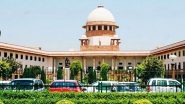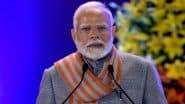Munich, Sep 19 (AP) Security has tightened at Oktoberfest after a deadly knife attack last month in western Germany, and officials are warning revellers to expect longer lines to enter as metal detectors are deployed for the first time in the Bavarian beer festival's 189-year history.
Authorities say there are no specific threats to the world's largest folk festival, which begins Saturday with the traditional keg-tapping in Munich and runs through October 6.
Also Read | Speculative and Misleading: MEA on Reuters Report Saying Ammunition From India Entering Ukraine.
Some 6 million participants, many wearing traditional lederhosen and dirndl dresses, are expected over the course of the event.
The stepped-up security comes after an August 23 attack in Solingen that left three dead and eight wounded. A 26-year-old Syrian suspect was arrested. He was an asylum-seeker who was supposed to be deported to Bulgaria last year but reportedly disappeared for a time and avoided deportation. The Islamic State militant group has claimed responsibility for the violence, without providing evidence.
The violence left Germany shaken and pushed immigration back to the top of the country's political agenda. In response, the Interior Ministry extended temporary border controls to all nine of its frontiers this week. The controls are set to last six months and are threatening to test European unity.
The effects of the Solingen attack and other recent violence across Germany will also be felt at Oktoberfest. Hand-held metal detectors will be used for the first time, with police and security staff using them on a random basis or following suspicious activity.
“We have had to react to the fact that attacks with knives have increased in recent weeks and months,” Munich Mayor Dieter Reiter told The Associated Press during a media tour of the festival grounds to highlight the new security measures. “We will do everything we can to ensure that nobody comes to Oktoberfest with a knife or other dangerous weapons.”
In addition to some 600 police officers and 2,000 security staff, more than 50 cameras will be installed across the grounds of the festival, which will be fenced off as well. Festival goers also are prohibited from bringing knives, glass bottles and backpacks.
Oktoberfest is no stranger to increased security in the past. In 2016, authorities implemented tighter measures in response to a series of attacks, including when a German teenager fatally shot nine people at a Munich mall before killing himself.
Painful memories remain of a bomb attack at the Oktoberfest entrance on September 26, 1980 that claimed 13 lives, including that of three children and the attacker, student Gundolf Koehler, a supporter of a banned far-right group. More than 200 people were wounded. An initial investigation concluded that Koehler acted alone. In 2014, federal prosecutors revisited the case after a previously unknown witness surfaced but could not corroborate indications there were co-conspirators.
Peter Neumann, a professor of security studies at King's College London, said Oktoberfest officials are taking a sensible approach to security in light of Solingen, as well as other recent foiled plots across Europe. Extremists and groups like the Islamic State seek locations where an attack would garner international headlines and “cause a lot of terror”, he said.
French authorities say they thwarted three plots against the Olympic and Paralympic Games in Paris and other cities that hosted the summer events, which included plans to attack “Israeli institutions or representatives of Israel in Paris”. And Austrian officials last month arrested a 19-year-old who had allegedly plotted to attack now-cancelled Taylor Swift concerts in Vienna and kill tens of thousands of fans.
“These are all global events where you can expect to cause a lot of attention,” Neumann said.
Neumann said the Islamic State has been gaining momentum during the Israel-Hamas war.
The group referenced the war when it claimed responsibility for the Solingen violence, saying the attacker targeted Christians and that as a “soldier of the Islamic State” he carried out the assaults “to avenge Muslims in Palestine and everywhere”.
Oktoberfest is a difficult event for police to secure, though authorities say there haven't been any concrete threats to the festival.
“It's an iconic event and this is exactly the kind of event that they'd want to strike,” Neumann said. “But with millions of people — drunk people to be honest — running around, it's really difficult to control every movement.”
The festival's organiser, Clemens Baumgartner, promised a safe public space, possibly "the safest place in Germany" during the 16 days of Oktoberfest. (AP)
(This is an unedited and auto-generated story from Syndicated News feed, LatestLY Staff may not have modified or edited the content body)













 Quickly
Quickly

















